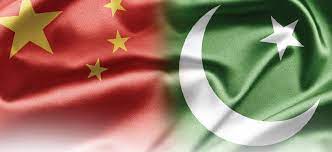
 Prime Minister Anwar-ul-Haq Kakar’s upcoming visit to China is of significant importance, as he has received a special invitation from President Xi Jinping to participate in the ‘Third Belt and Road Forum for International Cooperation’ scheduled to take place in Beijing from October 17-18.
Prime Minister Anwar-ul-Haq Kakar’s upcoming visit to China is of significant importance, as he has received a special invitation from President Xi Jinping to participate in the ‘Third Belt and Road Forum for International Cooperation’ scheduled to take place in Beijing from October 17-18.
Launched in 2013, the Belt and Road Forum (BRF) was established to promote high-quality cooperation within the BRI, a global development strategy initiated by the Chinese government with the aim of investing in infrastructure and enhancing trade and economic collaboration along the historic Silk Road trade routes.
The overarching aim of the BRI is to foster economic connectivity, trade, and infrastructure development spanning the vast expanse of Asia, Europe, and Africa, bolster collaboration among nations by constructing an intricate web of roads, railways, ports, and diverse infrastructure projects. Beyond physical connectivity, it encompasses financial cooperation, cultural exchanges, and the nurturing of people-to-people relationships.
It encompasses the pursuit of fresh markets for its goods and services, addressing overcapacity in sectors such as construction and steel production, and augmenting its geopolitical influence on the global stage. Concurrently, it endeavors to stimulate economic growth in less-developed regions within China while championing the global expansion of Chinese enterprises.
The visit of the Pakistan Prime Minister is notable because the China-Pakistan bilateral relationship is among the strongest globally. This relationship is often described as an “all-weather strategic cooperative partnership” and with phrases like “Higher than the Himalayas, deeper than the ocean, sweeter than honey, and stronger than steel. It is characterized by a high level of trust and cooperation, and encompasses diverse areas of shared interests, including trade, security, and regional cooperation.
China values Pakistan’s strategic location, which bridges South Asia, Central Asia, and the Middle East, making it crucial for China’s efforts to expand its influence in these regions. Pakistan’s large and growing economy, coupled with its youthful population, presents an attractive market for Chinese goods and services. Additionally, both countries share common interests in regional security, including countering terrorism and extremism. This reinforces the multifaceted importance of the China-Pakistan relationship in the current global context.
China is indeed Pakistan’s largest trading partner. In the fiscal year 2020-2021, the bilateral trade volume between China and Pakistan reached approximately $17.5 billion. China has consistently ranked as Pakistan’s top source of imports.
China has historically supported Pakistan on international issues, particularly concerning the Kashmir dispute. Pakistan, in return, has supported China’s positions on sensitive matters such as Xinjiang, Tibet, and Taiwan. This mutual support enhances the countries’ influence on the global stage.
The two nations have fostered strong people-to-people ties. An increasing number of Pakistani students study in China, facilitated by Chinese scholarships and training for Pakistani teachers. Additionally, a growing Chinese community in Pakistan further cements these connections.
China shares its technological expertise with Pakistan in critical fields, including artificial intelligence, renewable energy, and space technology. This collaboration contributes to Pakistan’s technological development and industrial growth.
As members of the Shanghai Cooperation Organization (SCO), they work together to promote regional security and cooperation in Central Asia. They also cooperate within the G77, a forum for developing countries to advocate their common interests on a wide array of international issues. Pakistan and China collaborate and support each other’s positions within the OIC.
The upcoming visit of the Prime Minister holds great significance, as the Prime Minister will be interacting with other world leaders attending the forum to pursue both bilateral, multilateral and international cooperations. This includes engaging with various global leaders to articulate Pakistan’s perspective on international issues and conflicts, such as the Russia-Ukraine War, Hamas-Israel conflict and Indian Illegally Occupied Jammu and Kashmir.
More importantly, it will allow Pakistan to showcase the success of CPEC, a flagship project of China’s Belt and Road Initiative, and a cornerstone of China’s broader vision of expanding its economic and strategic influence on the global stage. This could potentially encourage other participating countries to follow a similar path,
CPEC offers numerous advantages to both China and Pakistan. Specifically, it provides China with a more efficient route to the Arabian Sea, significantly enhancing its connectivity and trade options. Meanwhile, Pakistan stands to gain substantial economic growth and development through CPEC.
CPEC addresses critical issues, such as energy shortages, trade facilitation, and regional connectivity. By doing so, it holds the promise of generating employment, promoting industrialization, and fostering economic collaboration in Pakistan.
The motorways and other road networks built under CPEC have enhanced connectivity within Pakistan and with neighboring countries. Under this project, approximately 888 kilometers of new motorways and highways have been constructed, with another 853 kilometers of high-quality roads currently under construction. Several completed motorways, such as the Peshawar-Karachi Motorway (Multan – Sukkur Section), Hakla – D.I. Khan Motorway, and the Orange Line Metro Train in Lahore, have already been operational. Furthermore, initiatives like the Main Line-I (ML-I) railway upgrade project and developments in Gwadar, including the New Gwadar International Airport, the Pak-China Friendship Hospital, Gwadar East Bay Expressway, and the Gwadar Technical & Vocational Institute, have further enhanced regional connectivity and economic prospects.
Gwadar, Pakistan’s deep-sea port on the Arabian Sea, is a key component of CPEC and has the potential to become a major regional trade and transit hub. Extensive investments in Gwadar port and associated infrastructure, including roads, railways, and pipelines, are increasing connectivity and facilitating trade with neighboring nations, such as China, Iran, and Afghanistan.
CPEC has already achieved remarkable progress in the energy sector, with the completion of eleven power projects totaling over 6,370 MW. This includes the installation of 880 km of transmission lines, with additional projects expected to be completed by 2023-2024, ensuring a much-needed power supply for socio-economic and industrial growth. Furthermore, CPEC investments have created approximately 192,000 jobs and their secondary effects have contributed to economic development.
CPEC is now in its second phase, focusing on socioeconomic development, science and technology, agricultural cooperation, and industrialization. Of the 27 agreed-upon socioeconomic development projects, 17 fast-track projects have been initiated, with seven already completed and five in progress. This illustrates the continued commitment to strengthening economic and strategic ties between China and Pakistan. Valued at approximately $37 billion and predominantly funded by China, his phase encompasses the development of Special Economic Zones (SEZs), attracting foreign investment, reducing tariffs to boost trade, and enhancing agricultural productivity, along with investments in social welfare, infrastructure, and facilitating trade and investment between Pakistan and China, as well as with other nations through trade exhibitions and business forums.
In future, both BRI and CPEC are likely to continue development and expansion. The BRI is expected to continue expanding into more regions and countries. China has expressed its intent to strengthen economic ties with nations along the BRI routes, further deepening economic cooperation and connectivity. China has shown interest in addressing concerns related to debt sustainability, transparency, and environmental impacts, aiming to improve the reputation of the initiative. In future, BRI may expand from infrastructure, trade, and economic development to digital infrastructure, green energy, and technological cooperation.
The relationship between Pakistan and China stands as a beacon of strategic collaboration and shared interests, exemplifying the profound significance of their all-weather friendship.
Their unwavering support for each other on international platforms, particularly on issues such as the Kashmir dispute and Xinjiang, underscores the strength of this partnership.
The resounding success of the China-Pakistan Economic Corridor (CPEC) highlights the transformative potential of their cooperation, fostering economic growth, energy security, and regional connectivity.
As Pakistan takes part in the Belt and Road Forum (BRF), it seizes an invaluable opportunity to not only project CPEC as a model of accomplishment but also to further contribute to the global objectives of the Belt and Road Initiative. This forum serves as a platform for Pakistan to amplify its voice on international matters and advocate for multilateralism, ultimately enhancing the prospects of not just bilateral success but global cooperation and prosperity.
The author is Former Press Secretary to the President ,Former Press Minister to the Embassy of Pakistan to France,Former MD, SRBC





